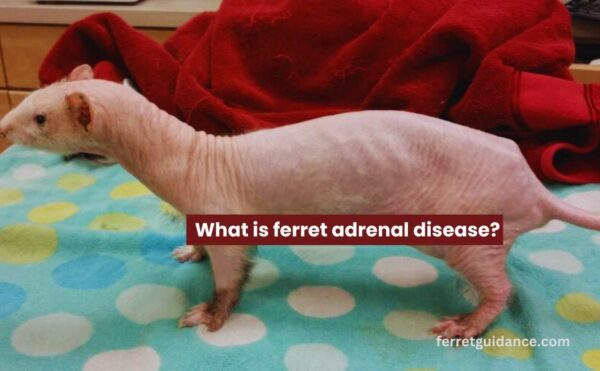Being a ferret owner you must be aware of the diseases your pet may be diagnosed with. In such case, you might wonder- what is ferret adrenal disease?
Well, adrenal disease in ferrets is the condition when your pet secretes excess sex hormones and cortisol. This can lead to many health issues for your furry friend.
In this article, you will know what are the signs and symptoms of ferret adrenal disease, the cause & it’s treatment and much more.
Content List
- 1 What is ferret adrenal disease?
- 2 What are the signs and symptoms of adrenal disease in ferrets?
- 3 Cause of adrenal disease in ferrets
- 4 Ferret adrenal disease diagnoses
- 5 How to treat adrenal disease in ferrets
- 6 Prevention of adrenal disease in ferrets
- 7 Ferret adrenal disease treatment cost
- 8 How long do ferrets live with adrenal disease?
- 9 What does the adrenal gland do in ferrets?
- 10 What will happen if adrenal disease isn’t treated in ferrets?
- 11 Frequently Asked Questions (FAQs)
- 12 Conclusion
What is ferret adrenal disease?
Adrenal disease in ferrets is one of the most common diseases especially in North America. Over time this problem keeps increasing and putting ferret owners more tense.
Like all mammals, ferrets too have two adrenal glands. Each gland is at the front edge of each kidney. The function of the gland is to secrete hormones that maintain various functions of the body.
Stress maintenance and hormone balance are two major functions performed by these glands. When these are conditions of the excess production of sex steroids and androgens then it causes many issues.
The problem created by this excess hormone secretion (especially sex hormone) is termed ferret adrenal disease.
There are many health issues and ways to cure this problem which you will know later in this article.
What are the signs and symptoms of adrenal disease in ferrets?
Adrenal disease in ferrets is quite a long-term problem. In 2003, 70% of the ferrets in the United States were infected with adrenal disease.

There are various signs of adrenal disease in ferrets. In some cases, it shows variously to different ferrets.
Following are the major signs of ferret adrenal diseases:
- Swollen vulva
- Body hair loss (usually starts from the tail)
- Increased water consumption which increases urination
- Increase in irritation and aggression
- Swellen in belly
Cause of adrenal disease in ferrets
The cause of adrenal disease in ferrets has been studied for a long time. It was hard to determine the exact cause of the ferret adrenal disease due to the different adrenal tumors in the ferret.
The various studies on ferrets from different locations, ages, and genders have helped to further out the cause of the adrenal disease in ferrets.
The major possible causes are the following:
Spaying or neutering
Places where ferrets are neutered at around the age of 1 year have no cases of adrenal diseases. It also depends upon the age and care of the ferret.
Usually, in the United States at the age of 4-6 weeks, ferrets get neutered. Which minimizes the chance of adrenal disease in ferrets.
Excess exposure to daylight
The excess light is not good for ferrers in both the normal and breeding phases. On any normal day, ferrets sleep for more than 14 hours and they need darkness.
The same happens during breeding season as well. If there is excess light during bedding then it imposes stress on ferrets to produce more sex hormones.
This puts extra tension on glands which results in adrenal disease in ferrets.
Genetics
Most ferrets come from breeders’ centers, which can be private or government-owned breeders. Our pets too come from such places.
So, the genes of ferrets matter a lot and all the breeders take special care of this. When genes aren’t well then it may be responsible for tumor growth in ferrets.
Ferret adrenal disease diagnoses
Are you wondering to know- how do you test for adrenal disease in ferrets?
First thing first, if you have any doubt about adrenal diseases in your pet then contact your vet immediately. The earlier you know the faster it cured.
Hair loss at the tail is first for both male and female ferrets. A swollen vulva is another symptom your female ferrets will exhibit. through which the easy diagnosis of adrenal disease can be made.
In some cases, abdominal ultrasound is needed to diagnose. Your vet may demand it as well.
How do you test for adrenal disease in ferrets?
There are several ways to test for adrenal disease in ferrets. We have already discussed the physical appearance path to diagnose ferret adrenal gland disease.
Here, I’m giving test information you will need to perform on your pet to identify the adrenal disease.
The most effective test is the ferret adrenal profile test. It involves checking the quality of oestradiol (E2), adrenal sex hormones, cortisol, and 17-Hydroxy-Progesterone (OHP).
The blood test to check the hormone level is also a good option for identifying adrenal disease in ferrets.
It’s important to note that all tests must be done under the supervision of the ferret vet. Also, performing a full test of your pet as one test like cortisol or oestradiol alone can’t give the right test results.
If your pet is female then pay special attention to it. Female ferrets are more affected by adrenal disease(70%) than males. The reason is obvious ie the reproduction in female ferrets.
How to treat adrenal disease in ferrets
Identifying adrenal diseases in your pet is one task but, the important one is to find out the treatment of the disease.

However, if your ferret is affected by adrenal disease in one gland then there is a quick solution. Removal of the affected gland can cure your pet’s disease.
But it’s not a permanent solution, there are chances of other glands being affected by adrenal disease. Removal of both glands is not a solution.
So, medical treatment is a safe and secure solution for adrenal disease in ferrets. It’s lower in cost than surgery and it also works for both affected glands.
Treating ferrets for adrenal disease involves multiple steps that are mentioned below:
1. Deslorelin
It is newly developed that can be used for multipurpose. It blocks adrenal stimulation and decreases hormone release.
The major advantage of deslorelin is that its effect lasts up to 2 years on any average ferret. But, there are also limitations, it doesn’t treat adrenal tumors.
2. Melatonin
It is injected under the skin of ferrets between the shoulder blades. Melatonin is injected into the body of a ferret about the size of rice.
Melatonin use may result in the loss of the ferret hair loss.
3. Leupron
Leupron is also known as leuprolide acetate. It decreases stimulation of the adrenal glands. It should be used once a month as per vet supervision.
It is responsible for stopping gonadotropin-releasing hormone in the ferret body.
4. Anastrozole
It is used to maintain the excess levels of estrogen caused by ferret adrenal diseases. It is used during the beginning and intermediate stages of the treatment of the adrenal problem in ferrets.
How to treat adrenal disease in ferrets at home?
Treating ferret adrenal diseases at home is not recommended, but for immediate situations, you can do it.
The first step should be to stimulate sufficient melatonin production in the ferret body. It can be done by providing complete darkness to your pet.
Ideally, the darkness time must be more than 14 hours, it involves sleeping time and eating time. You can do it by covering the bedding place or cage of ferrets using blankets.
To produce melatonin in the body of a ferret you can use melatonin supplements. Its effect is very well for some ferrets and doesn’t work for some.
So, use it under your vet’s instruction, and remember to feed melatonin supplements at the same time each day.
Prevention of adrenal disease in ferrets
Recent research has proved that giving leuprolide (or simply lupron) injections helps prevent ferret adrenal disease. The injection should be given yearly during the breeding season.
By the time the ferret matures, leuprolide controls the adrenal in your pet. Delaying neutering can also prevent adrenal disease in male ferrets.
According to the gender of the ferret, the dose timing differs:
- In January male ferrets should be given lupron injections.
- From mid-February to mid-March female ferrets should be given lupron dose.
- The injection can be given to ferrets of 6 months downwards.
Ferret adrenal disease treatment cost
As discussed above, the treatment of ferret adrenal disease involves multiple steps. To complete these steps it require different types of check-ups.
Blood tests, body examinations, and more are the must ferret checkups during adrenal treatment. It may cost from $ 40-$ 80 per month depending on the stage of the disease.
There is also medication expense which costs between $20 to $30. So, now you have a better idea about the expenses for the treatment of adrenal disease in ferrets.
How long do ferrets live with adrenal disease?
There is no direct answer to the duration of living of ferrets with adrenal disease. It is reported that most ferrets happily live without pain with adrenal gland diseases.

In some cases, the pain becomes unbearable for ferrets and may affect other body parts like kidneys, and glands.
With proper tests, checkups, and treatment under a ferret veterinarian, your pet can live for years. You will be glad to know that the recent research and improvements made it easier.
If treatment begins at the right time then your pet will be fully cured. Usually, ferret adrenal disease treatment takes one to two years.
What does the adrenal gland do in ferrets?
The adrenal gland is very crucial for the anatomy of the ferrets. It regulates and balances many important functions in ferrets.
Ferret adrenal glands produce adrenaline which helps ferrets deal with life-threatening situations like fight, fear, reaction, etc.
The glands produce an important hormone known as cortisol. It plays a vital role in maintaining blood sugar in ferrets.
The presence of protein, fats, and carbohydrates also balances in the ferret gland. So, we can say the adrenal gland in ferrets is very crucial for multiple reasons.
What will happen if adrenal disease isn’t treated in ferrets?
Adrenal disease is indeed treatable but, it is also life-threatening to your ferret if not treated in time.
It is proven and my vet also told me that a ferret may die in one to few months if an adrenal problem is left untreated.
So, if you notice any adrenal symptoms in your pet then contact them immediately. Any delay can cost the life of your furry friend.
Frequently Asked Questions (FAQs)
Is adrenal disease painful?
Yes, adrenal disease is quite painful. They exhibit abdominal pain, fatigue, and weakness.
What is the most useful test in the diagnosis of ferret adrenal disease?
Majorly, it’s blood tests that tell about adrenal disease in ferrets.
Can ferrets die from adrenal disease?
Yes, ferrets can die from adrenal disease if left untreated. It’s a life-threatening and life-shortening ferret disease.
How to treat adrenal disease in ferrets at home?
Melatonin supplements are used for adrenal disease in ferrets.
Can adrenal disease in ferrets be cured?
Yes, ferret adrenal disease can be cured through medication and surgery.
Conclusion
Now you know- what is ferret adrenal disease?
Adrenal disease in ferrets can harm in various ways. It is responsible for hair loss, excess blood sugar, lethargy, and more in your furry friend.
So, you must contact your vet to identify symptoms, diagnose, & treat your ferrets.
There are also some precautions you need to follow so that your ferret can’t get affected by adrenal disease.
